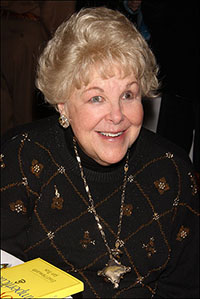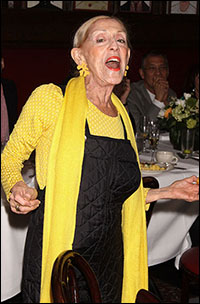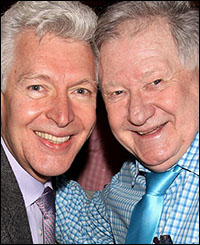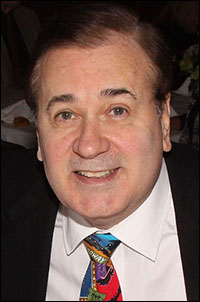
*
The NY Sheet Music Society came to relative order over the weekend, and the auditorium of Local 801 Musician's Hall on West 48th Street was filled to capacity with tales from the Harmonia Gardens, both rhapsodic and melancholy, relayed by denizens of Yonkers and Little Old New York (i.e., clusters of past Hello, Dolly! casts).
They came in waves — first the original Broadway show with Carol Channing, then the national-turned-international Mary Martin edition and, finally, La Channing's two subsequent tours-to-Broadway revivals. The room was swaying, you could say.
Hello, Dolly! officially marked its 50th anniversary Jan. 16, but its surviving casts delayed their celebration until the weekend. In addition to the story-swapping orientation on Saturday, there was a Sunday-brunch schmooze-fest and ultimate photo-op ("selfies" included) at Sardi's. When the anniversary cake was wheeled out, Charles Karel of the original cast led the gang in "a 50-year key reduction" version of "Hello, Dolly!" Nobody wanted it all to end, but it did after three hours.
Channing, who will turn 93 on Jan. 31, made neither event. Mindful of Kitty Carlisle's advice ("I don't care what they say, 96 is not as easy as 95!"), she was shoring up her strength for a Town Hall Q&A held Jan. 20, but she did send a note, which Mary Jo Catlett, also from the original cast, read to the gathering — in the star's inimitable speaking style: "While I am blessed and grateful to be working, I am saddened that the preparations and challenges of putting on a good show keep me from joining you today. My energy isn't what it used to be — but don't tell anybody. You have all been more than kind to me. You've been my champions." [The word "champions" wasn't arbitrarily arrived at and brought chuckles: The show was directed and choreographed by Gower Champion, with a silent assist from Mrs. Champion (Marge) and a loud-and-clear assist from his official "assistant to the director," Lucia Victor.] "You are the reason Dolly has triumphed for over 50 years. Gower and Mr. Merrick would be so proud."
All weekend long, whenever someone had a direct Channing quote to deliver, they did it in her distinctive baby-talk rasp. The best at this, by far, was Lee Roy Reams. Jerry Herman, who wrote the show's iconic score, also sent a note: "Dear Dolly alumnae... I want to personally thank you for your talent, your loyalty and your wonderful contribution for making this milestone possible. All I can say is: 'Wow, wow, wow, fellas. Look at the old girl now, fellas.' With thanks and much love."
Francine Pascal showed up and spoke for her late brother, Michael Stewart, who wrote a superb and hilarious book for Dolly. "For some reason, it's the punishment for dying too young," she said. "His name is forgotten and not mentioned enough."
| |
 |
|
| Mary Jo Catlett | ||
| Photo by Joseph Marzullo/WENN |
They were introduced by Linda Amiel Burns, who runs the NY Sheet Music Society. Skipper was still Dolly-ed up as Channing from his Don't Tell Mama act, and she was with her then-husband, Charles Lowe. Her reaction: "Oh, look, Charles, it's me."
On Saturday, she might well have been — given how expertly Skipper moderated the memory download, bringing on the principals in chronological order and directing them with specific questions that kept the proceedings bubbling along smoothly.
John Anthony Gilvey, author of the excellent "Before the Parade Passes By: Gower Champion and the Glorious American Musical," began the program with some pre-Dolly preliminary notes. The show David Merrick brought to Broadway in 1964 goes back to A Day Well Spent, John Oxernford's 1835 English play about two store clerks on a wild tear in London. It was adapted by Johann Nestroy into a Teutonic farce called Einen Jux will er sich machen, which Thornton Wilder turned into The Merchant of Yonkers. With Percy Waram in the title role, Tom Ewell and John Call as the two clerks and Jane Cowl as a newly created character, a Mrs. Levi, it ran 39 performances in 1938. But Wilder was pleased with the audience reaction that Mrs. Levi got and tinkered the piece back into life in 1955 with her as the lead character of The Matchmaker, with which Ruth Gordon made a hit in London and Broadway.
David Hartman, forever remembered for his 11 years of "Good Morning America," was next out of the chute, still a towering figure at six-foot-five with a booming voice of authority. He was assistant stage manager for the original production and, shoved by Champion into the spotlight, as Rudolph, the maître d' of the Harmonia Gardens. Champion, he said, had his priorities straight from the get-go. "They had built a ramp at the Mark Hellinger Theatre where we rehearsed, and Gower spent the first two weeks of rehearsal working with the male dancers and me, as Rudolph, doing 'The Waiter's Gallop' and 'Hello, Dolly!' while the leads were out in the lobby, pacing, wondering, 'When are we going to learn something?' Then, one day — a Sunday, I think — he decided to run the two numbers together, which we had never done before, with Peter Howard playing piano. It was like 22 minutes, and, when it was over, you could hear a pin drop. Gower listened from the back of the house and walked down to the ramp, looked up and said, 'I think maybe we've got something.'"
"It changed very little from those two weeks," chimed in Karal, the only singer drafted into "The Waiter's Gallop," and it was working from the first performance at the Detroit tryout on. "At the end of 'The Waiter's Gallop' and 'Hello, Dolly!' — back to back — we all experienced an explosion from the audience the likes of which I've never heard again. It was that same way every single performance throughout the entire run. Everyone stood to their feet, screamed and applauded and whistled and banged and did anything that they could to make noise. That was Gower's genius."
| |
 |
|
| Sondra Lee | ||
| Photo by Joseph Marzullo/WENN |
Ron Young (then billed as Ronnie Young) debuted as a singer-dancer with this show. "I came right from Oklahoma, very green," he dirt-kicked. "I arrived on Friday and went to the audition on Monday and was hired as a singer and dancer on Tuesday. Being on stage doing 'The Waiter's Gallop' and 'Hello, Dolly!' — having that ovation happen my first show, this hick from Oklahoma, it was, like, 'Oh, this is pretty easy.'"
Sondra Lee, the first and mini-est of Minnie Fays, said that not everyone was exactly on the same page about that: "The most unfavorite song in the entire score for Mr. Merrick — nobody ever called him David that I know — was 'Hello, Dolly!'"
She landed the role of Minnie Fay because Champion was impressed with her Tiger Lily in Peter Pan. "He called me in Italy where I was doing something else" [filming "La Dolce Vita" and possibly indulging in it — her autobiography is called "I've Slept with Everybody"]. "He said, 'I have something I'd like you to do' and spent me the script. I kept reading it and reading it, and finally I phoned him and said, 'I can't find it.' 'What? The script?' 'No. The part.' He said, 'That's why I called.' It was the first time in my life I never had to audition for a show! Do you know what that means?'"
At the outset, a film montage of Dolly Levis passing in parade opened up a floodgate of memories for her and, no doubt, others. "It was a deeply emotional experience for me," she admitted. "I just wanted to say that the people I worked with who are no longer with us — I loved being in the show with them and will never forget that experience as long as I live, in the theatre or out of the theatre. They were remarkable, remarkable entertainers. That was Gower. That was Charlie [Charles Nelson Reilly]. That was Eileen [Brennan]. That was Jerry Dodge. That was David Burns. I would love us all to give them the round of applause they really deserve." The audience complied with heartfelt enthusiasm.
Hello, Dolly! opened in Detriot Nov. 18, 1963, to such dismal reviews that Merrick was muttering he was going to close it right there. According to Reams, the show as saved by a columnist for the Detriot Free Press, Shirley Eder. A close friend of of Channing's, Eder collared the Variety critic "and said, 'You're going to give this show a good review.' He did, and Gower took that review to Los Angeles and got financial backing to take the show from David Merrick." When Champion came back and said he was prepared to buy the show, Merrick changed his mind and opted to ride it out.
There were eight parts of the show Champion wanted fixed that he then, one by one, systematically went about fixing. Three were fixed in Detroit. One was never fixed, said Hartman: "He was determined to make 'Come and Be My Butterfly' work. It was a dance number in Act 2, and it was in the show the first year on Broadway." The story goes that Champion phoned Herman at three in the morning once and abruptly announced he was taking the number out of the show. A polka ditty was substituted when Hello, Dolly! opened the Dorothy Chandler Pavilion in L.A. in 1965.
In Washington, where Hartman remembered "Frank Rich, the political writer, was tearing tickets for us when we opened," there was a New Year's Eve party held on the rooftop of the Willard Hotel. As the cast filed in, they got the first, pre-release earful of Louis Armstrong's "Hello, Dolly!" Initially, they thought it was miscasting.
The last change made for Broadway was a drastic, emphasis-shifting one, done during the last days of the Washington run. "Penny in My Pocket," the elaborate $100,000 production number for Horace Vandergelder that closed Act One, was scrapped in favor of a number about Dolly Levi rejoining the human race, "Before the Parade Passes By." Basically, Champion was making the same switch that Wilder had made, going from The Merchant of Yonkers to The Matchmaker. After two previews at the St. James — a matinee and evening performance Jan. 15 — it opened.
Jan LaPrade, who played half a horse to Bonnie Mathis' other half, remembered the long wait for reviews. "It was a big dinner-dance thing at Delmonico's, and Gower read the review." The first line of Walter Kerr's euphoric notice is still with her.
"Don't bother holding onto your hats, because you won't be needing them. You'd only be throwing them into the air anyway," Kerr began. The rest of the graph: "Hello, Dolly! is a musical comedy dream, with Carol Channing as the girl of it. Almost literally, it's a dream, a drunken carnival, a happy nightmare, a wayward circus in which the mistress of ceremonies opens wide her big-as-millstones eyes, spreads her white-gloved arms in ecstatic abandon, trots out onto a circular runway that surrounds the orchestra and proceeds to dance rings around the conductor."
Ethel Merman and Mary Martin, who — in that order — were the first choices to play Dolly Levi but passed, wound up playing the role in time: Merman did the last year of the Broadway run, and Martin led the first national tour that played five months in this country before taking off for Japan, Vietnam, Korea and London. Carleton Carpenter and Johnny Beecher, who clerked for this portion of the Dolly saga as Cornelius Hackl and Barnaby Tucker, took over the narrative at this point.
Russia was originally a stop on the international tour, Beecher recalled, "but when we were in Portland, just as we were about to leave for Japan, we heard on the six o'clock news that the Russians had canceled us. We had gotten shots for places we never went to. A vaccination table was set up backstage during the finale. We could see in the wings nurses with hypodermic needles. I know we all suffer through curtain speeches we never thought would end, but I never wanted this one to end."
| |
 |
|
| Tony Sheldon and Harvey Evans | ||
| Photo by Joseph Marzullo/WENN |
Spider Christopher Duncan, performing under the more conventional handle of Chris Calkins, joined the first national company in time to play the White House — "one of the great thrills" — understudied Harvey Evans' Barnaby and eventually played the role opposite Carpenter's Cornelius in the Chicago production.
"Gower was an amazing man to work with," he said. "He was my mentor as I became a director-choreographer. My career has been really because of working with him. He took me under his wing and encouraged me. I was 17, right out of high school."
Doing him one better, Andrea Wolf was a 16-year-old Ermengard when she joined the company in Rochester. "I'll never forget walking backstage, thinking 'All these beautiful people.' I was in awe — and, especially being 16, the boys! My God! Of course, none of them was interested in me. There was no satisfaction to be had!"
Evans had Debbie Reynolds to agent him into the national company. Champion had originally wanted him for the international tour, but he was a backup dancer in her Vegas act so, as one MGM star to another, she got him to ask Evans for the next one, which was the national company that returned to New York for Betty Grable's run. Being the good Samaritan got Wayne Clark into the company. He was in a Gilbert & Sullivan repertory in San Francisco and was asked by a Dolly exec if he knew any good tenors. He knew two and thought he'd accompany them to the audition. Neither showed. "I was embarrassed. Then, suddenly, Gower said, 'Can you read music?' I said, 'Yes.' They handed me 'Hello, Dolly!' How hard is that? I sang it. And then the stage manager came out and started measuring me. I was in."
Reams led off the revival portion of the program — and rightly so. He is the only person to do Hello, Dolly! more times than Channing. He was her Cornelius in the 1978 revival and her director for her last in1995 — and, when Michael DeVries chose not to continue with the part the three months after Broadway, her last Cornelius.
| |
 |
|
| Lee Roy Reams | ||
| Photo by Joseph Marzullo/WENN |
For Mrs. Malloy — Channing's last Mrs. Malloy — Reams insisted on, and got, Jeanne Lehman, with whom he had just done a nightclub act. Herman had caught the act and knew she could sing, but he still asked her to his home to read for the role. "As I approached the song, I saw Jerry easing over to the piano. He started playing, and I started singing. I'm glad I didn't know I would have to sing. We just made music. It was if the world didn't exist. That is still one of my most favorite memories."
Bob Lydiard, who was Barnaby to Reams' Cornelius, was handpicked for the role by Channing, but, before he was notified, Lucia Victor checked him out. "I want to make sure you know how to take direction," she told him. "If I say you are to do something, you are never allowed to alter it." He eagerly agreed not to improve.
"Mostly," Lyndiard said, "my interpretation of Barnaby Tucker was what not to do. 'Be careful. Do what I say, and don't try to improve it.' There were times when the other ladies who played Dolly were a little weaker certainly than Carol, and I needed to bump up the comedy. My director in Los Angeles told me to go for it, but, when Lucia got ahold of me, she said, 'Okay, we can tone that bit down a little now.'"
Megan Thomas, who signed up for the final portion of the tour, shared her memory of the very last performance. "None of us talked to each other about it, but, right before the 'Hello, Dolly!' number, something just sorta magically happened," she recalled. "Most of the women who were not in that number were in the dressing room, touching up their makeup or whatever. Then, all of a sudden, without even speaking to one another, we all ended up walking into the wings or into the orchestra pit, wherever you could get some view of the stage — the technical people, the makeup people, the hair people, whoever wasn't in that number — and we watched it because we all knew this probably was the last time Carol Channing was going to do that number in a full production. She maybe would do it at a gala, but it would be the last time in a full production of Hello, Dolly! I still hold that memory."











































